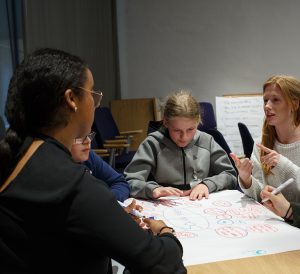
Asking Purposeful Questions
The Asking Purposeful Questions module is the foundational module that takes place over three sessions (skill session and two coaching sessions) and should be implemented first. All ACRES modules integrate the foundational skill of asking purposeful questions with additional skills and in new contexts.

Modeling Engineering Practices
This module should be used after educators have completed the introductory module, Asking Purposeful Questions, as this is a foundational skill and is revisited in subsequent modules. All ACRES modules integrate the foundational skill of Asking Purposeful Questions.

Exploring Youth Understanding
This module should be used after educators have completed the introductory module, Asking Purposeful Questions, as this is a foundational skill and is revisited in subsequent modules. All ACRES modules integrate the foundational skill of Asking Purposeful Questions.
Each module consists of three two-hour, virtual sessions, over the course of approximately two months. Each module follows the following outline:
Session 1: Participants are introduced to a skill and spend time experiencing and practicing the skill among peers. Participants then return to their program where they capture a short clip of the strategies in action.
Session 2: Participants share their clips, reflect on their practice, and share feedback with one another. They then return to their program to record a second round of practice.
Session 3: Participants gather for another coaching session where they share their second clip, reflect on their practice, and share feedback with one another.
Professional Learning Modules
Unless otherwise noted, each module consists of three two-hour, virtual sessions, over the course of approximately three months.
Asking Purposeful Questions is a foundational skill for STEM facilitation.
Participation in either Ready, Set, STEM! & Asking Purposeful Questions or Asking Purposeful Questions is a prerequisite for the rest of the modules. The remaining five modules can be completed in any order.
Ready, Set, STEM! & Asking Purposeful Questions
Are you ready to bring meaningful STEM learning into your program? In this introductory module, we discuss ways to structure STEM experiences that engage youth in active and collaborative learning. This module offers educators who are new to facilitating STEM, the opportunity to build supportive relationships with other educators, while exploring the principles of STEM learning. The first clip participants record in this module is of their STEM space. This module combines an introduction to STEM facilitation with the skill of Asking Purposeful Questions.
OR
Asking Purposeful Questions
Questions are the beginning of a path towards discovery, imagination, and STEM exploration. How can we help youth expand and clarify their thinking and develop their reasoning through the questions we ask them? In this foundational module we examine the structure and process of questioning and discuss how we can better listen and follow up with youth throughout STEM learning experiences. This module is designed for participants who have some experience facilitating STEM learning and would like to grow in their practice within a supportive group of other educators.
________________________________________________________
The remaining modules can be completed in any order:


